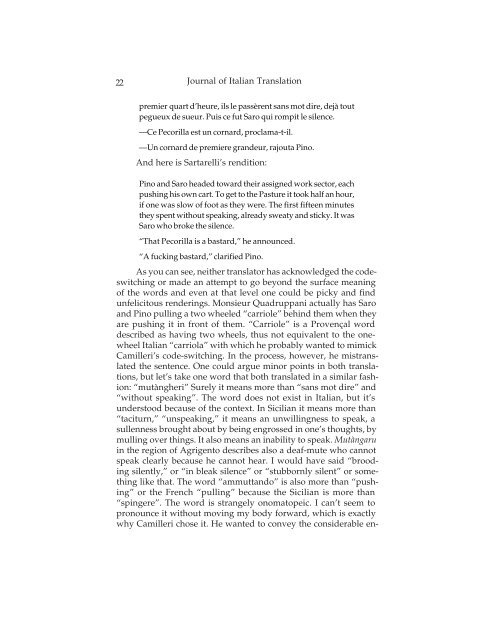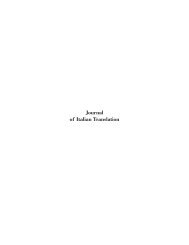Journal of Italian Translation
Journal of Italian Translation
Journal of Italian Translation
You also want an ePaper? Increase the reach of your titles
YUMPU automatically turns print PDFs into web optimized ePapers that Google loves.
22<br />
<strong>Journal</strong> <strong>of</strong> <strong>Italian</strong> <strong>Translation</strong><br />
premier quart d’heure, ils le passèrent sans mot dire, dejà tout<br />
pegueux de sueur. Puis ce fut Saro qui rompit le silence.<br />
—Ce Pecorilla est un cornard, proclama-t-il.<br />
—Un cornard de premiere grandeur, rajouta Pino.<br />
And here is Sartarelli’s rendition:<br />
Pino and Saro headed toward their assigned work sector, each<br />
pushing his own cart. To get to the Pasture it took half an hour,<br />
if one was slow <strong>of</strong> foot as they were. The first fifteen minutes<br />
they spent without speaking, already sweaty and sticky. It was<br />
Saro who broke the silence.<br />
“That Pecorilla is a bastard,” he announced.<br />
“A fucking bastard,” clarified Pino.<br />
As you can see, neither translator has acknowledged the code-<br />
switching or made an attempt to go beyond the surface meaning<br />
<strong>of</strong> the words and even at that level one could be picky and find<br />
unfelicitous renderings. Monsieur Quadruppani actually has Saro<br />
and Pino pulling a two wheeled “carriole” behind them when they<br />
are pushing it in front <strong>of</strong> them. “Carriole” is a Provençal word<br />
described as having two wheels, thus not equivalent to the one-<br />
wheel <strong>Italian</strong> “carriola” with which he probably wanted to mimick<br />
Camilleri’s code-switching. In the process, however, he mistranslated<br />
the sentence. One could argue minor points in both translations,<br />
but let’s take one word that both translated in a similar fashion:<br />
“mutàngheri” Surely it means more than “sans mot dire” and<br />
“without speaking”. The word does not exist in <strong>Italian</strong>, but it’s<br />
understood because <strong>of</strong> the context. In Sicilian it means more than<br />
“taciturn,” “unspeaking,” it means an unwillingness to speak, a<br />
sullenness brought about by being engrossed in one’s thoughts, by<br />
mulling over things. It also means an inability to speak. Mutàngaru<br />
in the region <strong>of</strong> Agrigento describes also a deaf-mute who cannot<br />
speak clearly because he cannot hear. I would have said “brooding<br />
silently,” or “in bleak silence” or “stubbornly silent” or something<br />
like that. The word “ammuttando” is also more than “pushing”<br />
or the French “pulling” because the Sicilian is more than<br />
“spingere”. The word is strangely onomatopeic. I can’t seem to<br />
pronounce it without moving my body forward, which is exactly<br />
why Camilleri chose it. He wanted to convey the considerable en-

















